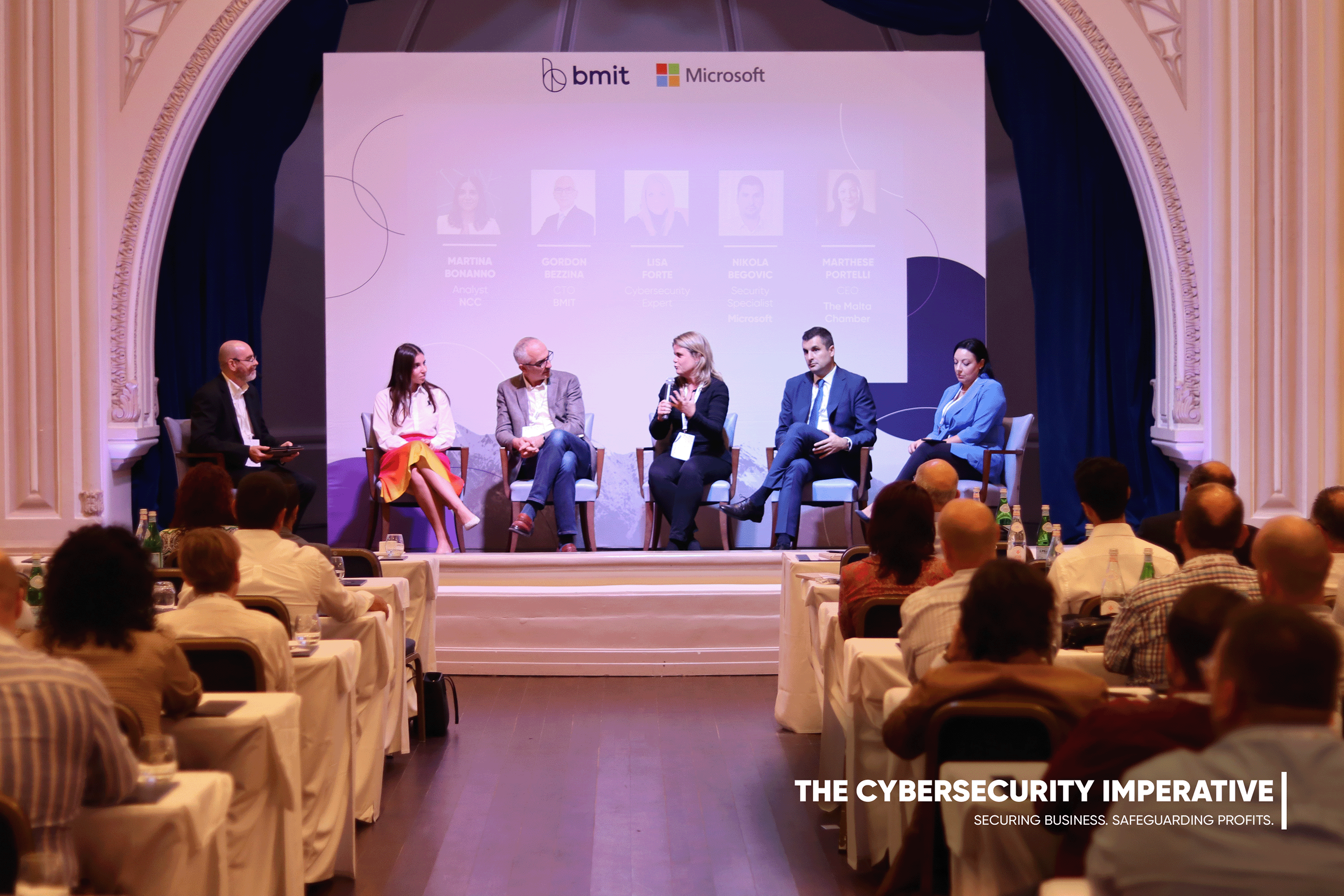The Cybersecurity Imperative: Securing Business, Safeguarding Profit conference, organised by BMIT as part of its activities around Cybersecurity Awareness Month, was a remarkable success!
The very well-attended event provided attendees valuable insights into the critical role of cybersecurity in today's business landscape. Let me summarise some of the key takeaways and highlights from the presentations and panel discussion at the end.
1. The Growing Cybersecurity Threat Landscape
One of the central themes of the conference was the ever evolving and expanding cybersecurity threat landscape. Businesses today are under constant threat from a multitude of cyber attacks, ranging from ransomware to sophisticated state-sponsored attacks. The consensus was clear: cybersecurity is no longer optional; it's an imperative. Even more worrying is that, as cybersecurity expert Lisa Forte explained, ransomware groups are run like businesses. At the end of the day, commented Nikola Begovic from Microsoft, it’s all about the money.
2. The Cost of Cyberattacks
Several presentations also highlighted the significant financial and reputational costs associated with cyberattacks. Cyber incidents can result in not only immediate financial losses but also long-term damage to a company's reputation, customer trust, and shareholder value. The price of inadequate cybersecurity can be devastating.
3. The Role of Artificial Intelligence and Machine Learning
In the age of cyber warfare, advanced technologies like Artificial Intelligence (AI) and Machine Learning (ML) are playing a pivotal role in identifying and mitigating cyber threats. Lisa Forte and Nikola Bregovic agreed that AI was not that much of a threat because criminals and hackers were doing just fine with toolset they had. However, as Gordon Bezzina, BMIT’s CTO explained, AI and ML had the potential to assist security teams when it came to detecting and responding to threats more quickly and accurately than ever before. These technologies are not just tools but integral components of a modern cybersecurity strategy. Nikola said that automation, using AI, will be very important for cybersecurity experts, even more so as companies struggle to find skilled cybersecurity resources. Thanks to the integration of AI in existing security technologies, security teams would be able to analyse large volumes of log data, for example, and react must faster to threats and events.
4. Importance of Employee Training
Conference attendees were reminded that human error is still a significant factor in many cyber incidents. Several presentations emphasised the importance of ongoing employee training and awareness programmes to build a strong human firewall. Companies should invest in educating their employees about cybersecurity best practices. Sean Cohen, Head of Tech Operations at BMIT, spoke about the human threat vs the human element and how, through education, breaches and cyber attacks could be prevented. Instilling a security culture throughout an organisation was important and employees needed to speak up as quickly as possible if they made a mistake.
5. Planning is key
Patricio Cerda from Veeam addressed a very important aspect of cybersecurity that many businesses don’t give a lot of attention too – disaster and recovery planning. What happens when your business is attacked and there is a breach or data leakage? Patrick explained how an attack is inevitable at some point and therefore it was critical for businesses to plan ahead. He spoke about disaster recovery, backup strategies and common sense, like not keeping all your data on one media or in the same location.
6. Developing much needed resources
Katia Bonello set the scene at the beginning by looking at the Maltese cybersecurity ecosystem and what the country is doing, through the National Cybersecurity Coordination Centre (NCC) to fight apathy and a lack of appetite among businesses to invest in cybersecurity. During the panel discussion, NCC analyst Martina Bonanna, spoke about the challenges and the NCC’s work with other NCCs in Europe. She spoke about the various initiatives to educate and encourage young people to take up a career in security. Gordon Bezzina, commented on the global skills shortage in cybersecurity, pointing out that the shortage was being felt across the industry not only for security roles but in other areas of IT.
7. The local scene
The panel session provided a platform to discuss some of the issues impacting local businesses and the state of cybersecurity awareness among local enterprise. Dr Marthese Portelli, CEO of the Malta Chamber, did not mince her words when describing local attitudes towards security and digitalisation in general. She emphasised that funding was available and encouraged businesses to take up these opportunities to invest where it was needed. If not, local businesses, risked falling behind, further putting their operations at risk.
The Cybersecurity Imperative: Securing Business, Safeguarding Profits conference brought together professionals and experts from diverse backgrounds to address the critical issues surrounding cybersecurity. Cybersecurity is no longer just an IT department’s issue; it's a fundamental business issue. Protecting our businesses and safeguarding profits requires a proactive approach to security, the right technologies, and a well-informed and prepared workforce.
The key points covered in the conference highlighted the urgency and importance of cybersecurity in the modern business landscape. To ensure your organisation's resilience and profitability, it’s crucial to implement a robust cybersecurity strategy, stay informed about evolving threats, and foster a culture of security.
The Cybersecurity Imperative is more critical than ever, and it's a responsibility we all share in safeguarding our businesses and profits in the digital age!

